ICC International Code of Advertising Practice
上海外国语大学英语翻硕备考资料-缩略语

上海外国语大学英语翻硕备考资料-缩略语1、ICAO(International Civil Aviation Organization)国际民用航空组织2、IDA(International Development Association)国际开发协会3、IFAD(International Fund for Agricultural Development)国际农业发展基金会4、IOJ(International Organization of Journalists)国际新闻工作者协会5、ICC(International Chamber of Commerce)国际商会6、UEA(Universal Esperanto Association)国际世界语协会7、INTELSAT(International telecommunications Satellitic)国际通信卫星机构8、IRTO(International Radio and Television Organization)国际广播电视组织9、IAEA(International Atomic Energy Agency)国际原子能机构10、NATO(North Atlantic Treaty Organization)北大西洋公约组织11、OPEC(Organization of Petroleum Exporting Countries)石油输出国组织12、OECD(Organization for Economic Cooperation and Development)经济合作与发展组织13、CMEA(Council for Mutual Economic Assistance)经济互助委员会(经互会)14、APEC(Asia and Pacific Economic Cooperation)亚洲太平洋经济合作组织15、ASEAN(Association of Southeast Asian Nations)东南亚国家联盟16、OAU(Organization of African Unity)非洲统一组织17、OIC(Organization of the Islamic Conference)伊斯兰会议组织18、CIS(Commonwealth of Independent States)独立国家联合体19、EU(European Union)欧洲联盟20、IPU(Inter-Parliamentary Union)各国议会联盟21、OSCE(Organization for Security and Cooperation in Europe)欧洲安全与合作组织22、EEC(European Economic Communities)欧洲经济共同体23、OEEC(Organization for European Economic Cooperation)欧洲经济合作组织24、NAM(the Non-Aligned Movement)不结盟运动25、ANC(African National Congress)非洲人民大会26、PLO(Palestine Liberation Organization)巴勒斯坦解放组织27、ICRC(International Committee of the Red Cross)红十字国际委员会28、NASA(National Aeronautics and Space Administration)美国航天太空总署29、NMD(National Missile Defense)国家导弹防御系统30、WB(World Bank)世界银行31、ADB(Asian Development Bank)亚洲开发银行32、EAC(East African Community)东非共同体33、SCO(Shanghai Cooperation Organization)上海合作组织34、SEAFDEC(Southeast Asian Fisheries Development Center)东南亚渔业开发中心35、SWIFT(Society for Worldwide Interbank Financial elecommunication)环球银行间金融电讯协会36、UNCITRAL(United Nations Commission on International Trade Law)联合国国际贸易法委员会37、UNCTAD(United Nations Conference on Trade and Development)联合国贸易与发展会议38、UNDP(United Nations Development Programme)联合国开发计划署。
法国包装法的 industrial classificaiton code
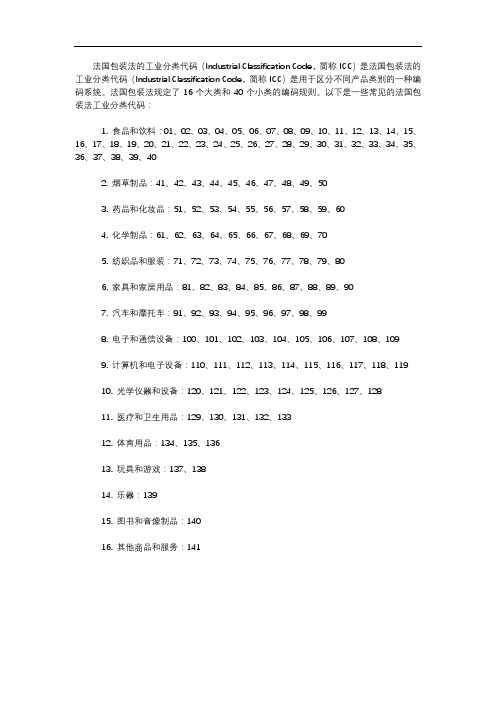
法国包装法的工业分类代码(Industrial Classification Code,简称ICC)是法国包装法的工业分类代码(Industrial Classification Code,简称ICC)是用于区分不同产品类别的一种编码系统。
法国包装法规定了16个大类和40个小类的编码规则。
以下是一些常见的法国包装法工业分类代码:1. 食品和饮料:01、02、03、04、05、06、07、08、09、10、11、12、13、14、15、16、17、18、19、20、21、22、23、24、25、26、27、28、29、30、31、32、33、34、35、36、37、38、39、402. 烟草制品:41、42、43、44、45、46、47、48、49、503. 药品和化妆品:51、52、53、54、55、56、57、58、59、604. 化学制品:61、62、63、64、65、66、67、68、69、705. 纺织品和服装:71、72、73、74、75、76、77、78、79、806. 家具和家居用品:81、82、83、84、85、86、87、88、89、907. 汽车和摩托车:91、92、93、94、95、96、97、98、998. 电子和通信设备:100、101、102、103、104、105、106、107、108、1099. 计算机和电子设备:110、111、112、113、114、115、116、117、118、11910. 光学仪器和设备:120、121、122、123、124、125、126、127、12811. 医疗和卫生用品:129、130、131、132、13312. 体育用品:134、135、13613. 玩具和游戏:137、13814. 乐器:13915. 图书和音像制品:14016. 其他商品和服务:141。
国际贸易、航运、租船和保险缩略语(I-Icc)
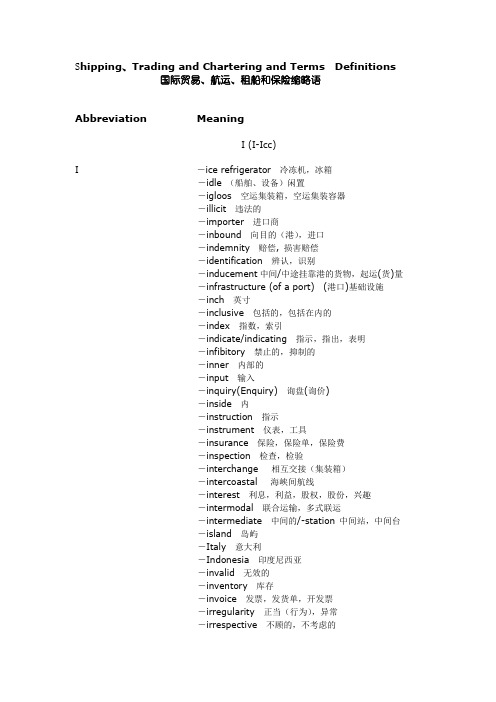
S hipping、Trading and Chartering and TermsDefinitions 国际贸易、航运、租船和保险缩略语Abbreviation MeaningI (I-Icc)I -ice refrigerator 冷冻机,冰箱-idle (船舶、设备)闲置-igloos 空运集装箱,空运集装容器-illicit 违法的-importer 进口商-inbound 向目的(港),进口-indemnity 赔偿, 损害赔偿-identification 辨认,识别-inducement中间/中途挂靠港的货物,起运(货)量-infrastructure (of a port) (港口)基础设施-inch 英寸-inclusive 包括的,包括在内的-index 指数,索引-indicate/indicating 指示,指出,表明-infibitory禁止的,抑制的-inner 内部的-input 输入-inquiry(Enquiry) 询盘(询价)-inside 内-instruction 指示-instrument 仪表,工具-insurance 保险,保险单,保险费-inspection 检查,检验-interchange 相互交接(集装箱)-intercoastal海峡间航线-interest 利息,利益,股权,股份,兴趣-intermodal 联合运输,多式联运-intermediate 中间的/-station 中间站,中间台-island 岛屿-Italy 意大利-Indonesia 印度尼西亚-invalid 无效的-inventory 库存-invoice 发票,发货单,开发票-irregularity 正当(行为),异常-irrespective 不顾的,不考虑的-issue 签发,开立,发行-itinerary 航线,路线-inward 进港的IA-immediate action 立即行动-immediate access 立即存取-implementation agreement 履行协定-indirect arbitrage 间接套汇-Insured, assured 被保险人-interalia (拉) 首先,尤其,除了别的以外-international airport 国际机场-international arbitration 国际仲裁-Iran (IR) 伊朗I/A independent action 独立(单独)定价、个别调价权IAC -including address commission 包括租船佣金-intermodeladministrative charge 多式联运管理费IACS International Association of Classification Societies国际船级社协会IADA Intra Asia Discussion Agreement亚洲区内讨论协议组织IADS International Association of Dry Cargo Shipowners 国际干货船东协会IAGOC in apparent good order and condition外表状况良好IAGW if all going well 如果一切顺利,如果状况良好IAL Incentive Allowance补贴,回佣,奖励费IAN import advice note 进口通知单IAOD in addition to other duties 除本职外兼任IAP -initial approach 初步接近-international airport 国际机场-intermodal containerized at pier 码头装箱联运-Indonesia additional premium surcharges印尼港口保险附加费IAR insurance, all-risk 平安险,一切险IAS Inland Additions内陆转运附加费IATA International Air Transport Association国际航空运输协会IATR is amended to read 修改为…IAW in accordance with 根据,依据…,与…一致IB-ibidem ( in the same place) (拉) 在同处-ice box 冰盒,冰箱-identification beacon 识别信标-immigration branch 入境处-import bills 进口汇票-improvement and betterment 改进和改善-in ballast 压舱-in board 在船内,向内,(空运)机内的,舱内的-in bond 海关监管(货物),未完税(货物)-indemnity bond 担保书,保赔书-in bulk 散装,大批量-issuing bank 开证行-instruction book 说明书-insurance broker 保险经纪人-introducing broker 介绍经纪人IBC -intermediate bulk carrier 中型散装货船-intermediate bulk container 中型集装箱—Transfer to Bonded Warehouse货进保税仓I,B/L inland bill of lading 内陆提单,内运提单1BP one safe port 一个安全港口IBW isolation bonded warehouse 隔离式保税仓库IC-identification code 识别码-identity card 身份证-(I/C) in commission (保险)在执行中-in charge of 主管,负责-inducement cargo 起运量货物-inland carrier 内陆航线承运人-issuing carrier 公共承运人-inspection certificate检查证书,品质、重量检验证书-insulated container 保温集装箱-insurance claim 保险索赔-insurance certificate 保险证明书,保险保证书-integrated contractor 综合承包人-internal communications 内部通信-inventory carrying cost 存货存量成本-inward cargo 进港货物ICA —international claims association 国际索赔协会—Interim Currency Adjustment Factor临时汇率调整附加费ICAO International Civil Aviation Organization国际民用航空组织ICATC/ATC if used actual time to count如果使用,按实际使用时间计算ICC -interim certificate of class 临时船级证书-Institute Cargo Clause (A.B.C.) LONDON伦敦保险协会货物保险条款(A) (B) (C)-interstate commerce commission州际商业委员会(美国)-international chamber of commerce国际商会-ICCU Container Group ICCU集装箱集团(意大利)—incentive compens补贴、回佣、奖励费。
ICC
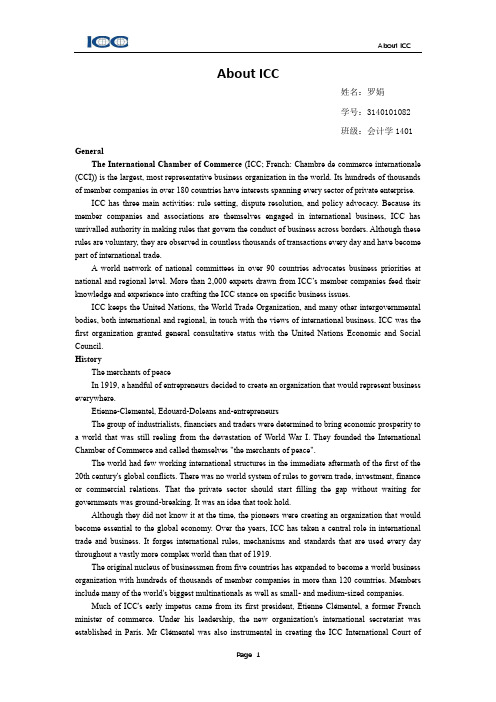
About ICC姓名:罗娟学号:3140101082班级:会计学1401GeneralThe International Chamber of Commerce (ICC; French: Chambre de commerce internationale (CCI)) is the largest, most representative business organization in the world. Its hundreds of thousands of member companies in over 180 countries have interests spanning every sector of private enterprise.ICC has three main activities: rule setting, dispute resolution, and policy advocacy. Because its member companies and associations are themselves engaged in international business, ICC has unrivalled authority in making rules that govern the conduct of business across borders. Although these rules are voluntary, they are observed in countless thousands of transactions every day and have become part of international trade.A world network of national committees in over 90 countries advocates business priorities at national and regional level. More than 2,000 experts drawn from ICC’s member companies feed their knowledge and experience into crafting the ICC stance on specific business issues.ICC keeps the United Nations, the World Trade Organization, and many other intergovernmental bodies, both international and regional, in touch with the views of international business. ICC was the first organization granted general consultative status with the United Nations Economic and Social Council.HistoryThe merchants of peaceIn 1919, a handful of entrepreneurs decided to create an organization that would represent business everywhere.Etienne-Clementel,Edouard-Doleans and-entrepreneursThe group of industrialists, financiers and traders were determined to bring economic prosperity to a world that was still reeling from the devastation of World War I. They founded the International Chamber of Commerce and called themselves "the merchants of peace".The world had few working international structures in the immediate aftermath of the first of the 20th century's global conflicts. There was no world system of rules to govern trade, investment, finance or commercial relations. That the private sector should start filling the gap without waiting for governments was ground-breaking. It was an idea that took hold.Although they did not know it at the time, the pioneers were creating an organization that would become essential to the global economy. Over the years, ICC has taken a central role in international trade and business. It forges international rules, mechanisms and standards that are used every day throughout a vastly more complex world than that of 1919.The original nucleus of businessmen from five countries has expanded to become a world business organization with hundreds of thousands of member companies in more than 120 countries. Members include many of the world's biggest multinationals as well as small- and medium-sized companies.Much of ICC's early impetus came from its first president, Etienne Clémentel, a former French minister of commerce. Under his leadership, the new organization's international secretariat wasestablished in Paris. MrClémentel was also instrumental in creating the ICC International Court of Arbitration in 1923.From the very beginning, ICC spoke out on behalf of business in making representations to governments and intergovernmental organizations. Three ICC members served on the Dawes Commission, which drew up the international treaty on war reparations in 1924.In the 1920s, ICC focused on reparations and war debts. Then the disastrous Smoot-Hawley tariff in the United States set the scene for the economic nationalism of the 1930s. ICC struggled through those years of depression to hold back the tide of protectionism as another world war loomed.ICC issued the first version of its Uniform Customs and Practice for Documentary Credits, still used by banks all over the world to finance trade, in 1933. Incoterms® the standard trade definitions that are familiar to every trader came in 1936, updated whenever necessary since then. And, the following year, ICC introduced its first International Code of Advertising Practice.ICC was awarded the highest level consultative status with the United Nations (UN) in 1946, and since then has represented the private sector by engaging in a broad range of activities with the UN and its specialized agencies.ICC has remained a diligent advocate of the open multilateral trading system through successive trade rounds, including the Doha Round. As ICC membership included more and more countries in the developing world, the organization stepped up demands for the opening of world markets to their products, especially agriculture.To meet the needs of its members, ICC has expanded its activities over the years. ICC Commercial Crime Services, based in London, was founded in the 1980s to address all aspects of commercial crime. The World Chambers Federation provides a hub for chambers of commerce throughout the world.Today, 13 ICC commissions comprising experts from the private sector cover specialized fields of immediate concern to international business. Subjects range from banking techniques to taxation, from competition law to intellectual property rights, telecommunications and information technology, from transport, environment and energy to international investment and trade policy.All these activities fulfil the pledge in ICC's constitution "to further the development of an open world economy with the firm conviction that international commercial exchanges are conducive to both greater global prospe rity and peace among nations.‖MembershipThere are two ways to become a member of ICC:1. Through affiliation with an ICC national committee or group.2. By direct membership with the ICC International Secretariat when a national committee/group has not yet been established in the country/territory.Governing bodiesWorld CouncilICC's supreme governing body is the World Council, consisting of representatives of national committees. The World Council elects ICC’s highest officers, including the Chairman a nd the Vice-Chairman, each of whom serves a two-year term. The Chairman, Vice-Chairman and the Honorary Chairman (the immediate past Chairman) provide the organization with high-level world leadership. They play an important role in ICC section.Executive BoardStrategic direction for ICC is provided by its Executive Board, consisting of up to 30 businessleaders and ex-officio members. It is elected by the World Council on the recommendation of the Chairmanship. Meeting three times a year, the Executive Bo ard oversees the establishment of ICC’s strategic priorities and the implementation of its policies.International SecretariatThe ICC International Secretariat, based in Paris, is the operational arm of ICC. It develops and carries out ICC’s work program, feeding business views into intergovernmental organizations on issues that directly affect business operations. The International Secretariat is led by the Secretary General, who is appointed by the World Council.National CommitteesIn 92 of the world’s nations, members have established formal ICC structures called national committees. In countries where there is no national committee, companies and organizations such as chambers of commerce and professional associations can become direct members.Finance CommitteeThe Finance Committee advises the Executive Board on all financial matters. On behalf of the Executive Board, it prepares the budget and regularly reports to the board. It reviews the financial implications of ICC activities and supervises the flow of revenues and expenses of the organization. Dispute Resolution ServicesICC's administered dispute resolution services help solve difficulties in international business. ICC Arbitration is a private procedure that leads to a binding and enforceable decision.The International Court of Arbitration of the International Chamber of Commerce steers ICC Arbitration and has received 20,000 cases since its inception in 1923. Over the past decade, the Court's workload has considerably expanded.The Court's membership has also grown and now covers 85 countries and territories. With representatives in North America, Latin and Central America, Africa and the Middle East and Asia, the ICC Court has significantly increased its training activities on all continents and in all major languages used in international trade.ICC Dispute Resolution Services exist in many forms:Arbitration is a flexible and efficient dispute resolution procedure leading to binding and final decisions subject to enforcement worldwide.Mediation is a flexible technique, conducted privately and confidentially, in which a neutral facilitator helps parties to seek a negotiated settlement of their dispute.Dispute boards are independent bodies designed to help resolve disagreements arising during the course of a contract.Expertise is a way of finding the right person to make an independent assessment on any subject relevant to business operations.DOCDEX provides expert decisions to resolve disputes related to documentary credits, collections and demand guarantees, incorporating ICC banking rules.Policy and business practicesICC policies, rules and standards are prepared by specialized working bodies. Normal procedure requires policy statements first to be adopted by a commission, in consultation with national committees, and then approved by the Executive Board, before they can be regarded as official and public ICC positions.Commissions examine major policy issues of interest to world business. Each national committee (NC) or group may appoint delegates to represent it at meetings. Officers are appointed by theChairman and Secretary General in consultation with NCs. Meetings of commissions are normally held twice a year.Task forces are constituted under the various commissions for a limited period to undertake specific projects and report back to their parent commission. Some task forces may include representatives of more than one commission.Code of Advertising and Marketing Communication PracticeIn September 2011, the International Chamber of Commerce introduced the newly revised consolidated ICC Code of Advertising and Marketing Communication Practice, along with a dedicated website, , to guide advertising and marketing professionals around the globe. Th is Code sets ethical standards and guidelines for businesses using today’s rapidly changing technology, tools and techniques to market products and services. Developed by experts from all sectors of industry and all regions of the world, the code’s purpose is to protect consumers by clearly setting out guidelines for responsible marketing.The Code is structured in two main sections—General Provisions and Chapters. The General Provisions section contains fundamental principles and other broad concepts that apply to all marketing in all media. Code Chapters are detailed and apply to specific marketing areas, including: Sales Promotion, Sponsorship, Direct Marketing, Digital Media and Environmental Marketing Claim. World Chambers FederationIn 1951, ICC established the World Chambers Federation (WCF), formerly the International Bureau of Chambers of Commerce. WCF is the unique global forum uniting the worldwide network of more than 12,000 chambers of commerce and industry. It aims to facilitate the exchange of best practice and the development of new global products and services for chambers, and foster international partnerships between chambers and other stakeholders to help local businesses grow. WCF is a non-political, non-governmental body, with its membership comprising local, regional, national, bilateral and transnational chambers of commerce, as well as public-law and private-law chambers.WCF was established by ICC and its chamber members following a resolution at the conclusion of the World Congress of Chambers of Commerce (Rome 1950). At its inaugural committee meeting held in Paris in December 1950, WCF was to be first known as the International Information Bureau of Chambers of Commerce. As its role expanded and grew during the 1960s, its name changed to become the International Bureau of Chambers of Commerce and by June 2001, it became known as the World Chambers Federation.With a history spanning over 400 years, chambers today exist in almost every country and business community around the world. Chambers of Commerce and Industry can be defined as: multi-sector organizations that accept members without sectorial restrictionsnot pursuing political goals (i.e., they do not participate in elections or nominate candidates for political positions)acting as a voice for the business community (i.e., they advocate for business and promote legislation that is advantageous to business)facilitating the role of chambers of commerce as local business support agenciesAdministering the international guarantee chain of ATA Carnets, the Customs document allowing the duty-free and tax-free temporary import of goodsImproving the capacity of chambers in issuing certificates of origin, including the management of an International CO chainWorld Chambers Network – a website platform with services including a Global Chamber Directory, Business Opportunities Promotion Service Chamber-Trust Business Accreditation Program Chamber Professional and institutional development servicesWCF also organizes the World Chambers Congress every two years in a different region of the world. The Congress is the only international forum for chamber leaders and professionals to share best practices, exchange insights, develop networks, address the latest business issues affecting their communities, and learn about new areas of innovation from chambers around the world.During the Congress, WCF also announces the winners of World Chambers Competition, the only global awards program to recognize the most innovative projects undertaken by chambers of commerce and industry from around the world. The next Congress will be held in Torino in 2015.Special projects and initiativesBusiness Action to Stop Counterfeiting and PiracyICC established BASCAP to take a leading role in the fight against counterfeiting and piracy.BASCAP unites the global business community to more effectively identify and address intellectual property rights issues and petition for greater commitments by local, national and international officials in the enforcement and protection of IPR.The work of BASCAP aims to:Increase both awareness and understanding of counterfeiting and piracy activities and the associated economic and social harmCompel government action and the allocation of resources towards improved IPR enforcement Create a culture change to ensure intellectual property is respected and protectedBASCAP speaks out on the damage caused by counterfeiting and piracy, including:Harm to the economy, loss of employment prospectsDanger to consumer health and safetyLoss of innovation and poor quality productsFinancial links to organized crimeErosion of technology transferBusiness Action to Support the Information SocietyICC set up BASIS (Business Action to Support the Information Society) in mid-2006 to speak out on a wide range of critical issues, including:Internet governance matters such as data protection, privacy, security, and the technical management and coordination of the Internetliberalization of the telecoms marketentrepreneurshipinnovationICTs as tools for developmentICC Business World Trade AgendaThe International Chamber of Commerce (ICC), in partnership with the Qatar Chamber, launched the ICC Business World Trade Agenda initiative in March 2012 to provide private sector leadership in shaping a new multilateral trade policy agenda. The aim of this initiative is ultimately to drive World Trade Organization (WTO) multilateral trade talks out of an 11-year deadlock and "beyond Doha".The World Trade Agenda is a strong business-led initiative to bolster rules-based trade. The WTO lends its support to this initiative by engaging business to provide recommendations to advance global trade negotiations.The World Trade Agenda aims to:Define multilateral trade negotiation priorities for businessHelp governments set a trade policy agenda for the 21st century that contributes to economic growth and job creationFind answers to the current economic crisis and drive more effective trade talksSet concrete recommendations to advance global trade negotiationsSound the alarm on protectionismGather input and validation from the global business community on trade agenda priorities and recommendations for achieving a Doha victorySince its launch, the World Trade Agenda initiative has organized consultations with CEOs and senior executives in all major regions of the world to gather input and validation of its recommendations. These business priorities were released during the ICC World Trade Agenda Summit on 22 April 2013 in Doha.The Agreement on Trade Facilitation was finally adopted at the WTO's 9th Ministerial Conference on 7 December 2013. It was the first major agreement on trade facilitation to have been reached since the creation of the WTO.ICC and the United NationsSince 1946, ICC has held top-level consultative status with the United Nations and a close working relationship with its specialized agencies.Policy CommissionsICC commissions are specialized working bodies composed of business experts who examine major issues of interest to the business world. They prepare policy products, including statements to contribute to intergovernmental discussions, as well as rules and codes to facilitate international business transactions.ContractsICC, through these commissions, makes policy in: arbitration, banking, commercial law, competition, corporate responsibility and anti-corruption, e-Business, IT and telecoms, environment and energy, intellectual property, marketing and advertising, taxation, trade and investment, and customs and trade facilitation.The strength and legitimacy of ICC policy statements and rules are derived from the fact that they are developed through extensive consultation with member companies. ICC’s normal consultative procedure requires policy documents first to be adopted by one or more commissions, in consultation with national committees, and then approved by the Executive Board, before they can be regarded as official and public ICC positions.ICC is dedicated to business self-regulation and has developed a large array of voluntary rules, guidelines and codes to facilitate business and to spread best practice. These rules are used in billions of dollars’ worth of trans actions every year and provide an invaluable service to businesses across the globe.ICC issues products including the Uniform Customs and Practice for Documentary Credit, the most widely used set of rules in trade finance. ICC has also been publishing a set of international rules for the interpretation of trade terms, called Incoterms®, since 1936. These have become the undisputed worldwide contractual standard for facilitating international trade.Model contracts are another ICC product that helps companies by simplifying international business transactions. ICC model contracts are legal tools that any company may adapt to its needs,thereby shortening the time it spends on negotiations, saving money and encouraging trade.ICC guidelines set out business principles for efficient customs administrations. To facilitate the use of information and communication technologies (ICTs) and the Internet, ICC offers guidance on data protection, tools to address privacy matters, and a range of best practice and policy guidance on communications infrastructure and services.Commission on Arbitration and ADRAbout the Commission on Arbitration and ADRThe Commission on Arbitration and ADR is ICC's rule-making body and unique think tank in the field of international dispute resolution. The commission drafts and revises the various ICC rules for dispute resolution, including the ICC Rules of Arbitration, the ICC ADR Rules, the ICC Dispute Board Rules, and the ICC Rules for Expertise. In its research capacity, it proposes new policies in the interest of efficient and cost-effective dispute resolution and provides useful tools for the conduct of dispute resolution. It also produces reports and guidelines on legal, procedural and practical aspects of dispute resolution, which are published regularly in electronic format, in the ICC Bulletin, or in separate booklets.The commission provides for a global forum of around 700 members coming from more than 92 countries including lawyers, in-house counsel, arbitrators, mediators, law professors and experts in various dispute resolution fields. All contribute to ensure that ICC dispute resolution services adapt to the legislative and technological developments. The specific work of the commission is often carried out in smaller task forces. The commission holds two plenary sessions per year at which proposed rules, reports and guidelines are discussed, debated, and voted upon.The commission's objectivesDraft and amend ICC's Arbitration, Mediation, Expert Determination, Dispute Board and other forms of dispute resolution rules;Study the juridical and other aspects of arbitration and other modes of international dispute settlement, and examine them in view of current developments;Provide reports, guidelines and best practices on a range of topics of current relevance to the world of international dispute resolution, with a view to improving ICC dispute resolution services;Create a link among arbitrators, counsel and users to enable ICC dispute resolution to respond effectively to users' needs;Act as a forum for ideas on issues relating to international arbitration and other forms of dispute resolution; andPromote ICC's various dispute resolution services globally.Recent developmentsAfter having successfully launched the 2012 ICC Rules of Arbitration and the new ICC Mediation Rules which came into force on 1 January 2014, the Commission also approved the ICC Expert Rules, the ICC Dispute Board Rules and the DocDex Rules.The new ICC Report Decisions on Costs in International Arbitration helps to meet the expectations of arbitration users by providing on overview of how arbitrators decide on costs and is the Commission's latest initiative to encourage efficient and costs- effective procedural conduct.Other recent developments of the ICC Commission on Arbitration and ADR include the release of a new edition of its Guide to National Procedures for Recognition and Enforcement of Awards under the New York Convention. This enlarged and updated edition now covers 79 Country Answers and takes account of recent legal developments.The commission also published Effective Management in Arbitration - A Guide for In-House Counsel and Other Parties' Representatives. This Guide is meant to provide client representatives, such as in-house counsel, managers or government representatives, with a practical tool-kit to assist them in making effective time and cost decisions throughout an arbitration. Two other reports, the Report on States, State Entities and ICC Arbitration and the Report on Techniques for Controlling Time and Costs in Arbitration were issued by the Commission in 2012.Other active Task Forces are the Task Force on Financial Institutions and International Arbitrations, as well as the Task Force on Emergency Arbitrator Proceedings. A Task Force on the Probative Value of Witness Evidence and a Task Force on the Revision of the Rules of ICC as Appointing Authority in UNCITRAL or other Ad Hoc Arbitration Proceedings were recently created.ICC Banking CommissionThe World's Essential Rule-Making Body for the Banking IndustryWith over 80 years of experience and more than 600 members in more than 100 countries, the ICC Banking Commission - ICC largest commission - has rightly gained the reputation of being the most authoritative voice in the field of trade finance.ICC RulesThe ICC Banking Commission produces universally accepted rules and guidelines for international banking practice. ICC rules and guidelines on documentary credits, entitled UCP 600, are the most successful privately drafted rules for trade ever developed, serving as the basis of US$2 trillion worth of trade transactions a year.Rules and Guidelines on Documentary Credits (UCP 600)Uniform Rules for Forfaiting (URF)Uniform Demand Guarantees Rules (URDG 758)Uniform Rules for Bank Payment Obligation (URBPO)International Standard Banking Practice (ISBP)Policy-makingThe ICC Banking Commission is helping policy makers and standard setters to translate their vision into concrete programmes and regulations to enhance business practices throughout the world.Publications and Market IntelligenceUsed by banking professionals and trade finance experts worldwide, the commission's publications and Market Intelligence is the industry's most reputable and reliable source of guidance to bankers and practitioners in a broad range of fields.Dispute ResolutionThe ICC Banking Commission and International Centre for Expertise administer the ICC Rules for Documentary Instruments Dispute Resolution Expertise (DOCDEX) to facilitate the rapid settlement of disputes arising in banking.Education and CertificationOver ten thousand people in over 100 counties have been trained and certified in international trade finance using our suite of ICC approved online training services and certification facilities. Visit our Education and Certification page to view all of the opportunities including the renowned Certification for Documentary Credit Specialists (CDCS)Below is a list of our online training suite for trade finance- the most comprehensive platform for online training in documentary credits, standby letters of credit, collections and demand guarantees.Documentary CollectionsMentor 600Documentary Credits (DC) MasterInternational Standby Practices (ISP) MasterUniform Rules for Demand Guarantees (URDG) MasterUniform Rules for Bank Payment ObligationsInternational Standard Banking Practice (ISBP)Specialized Trainings and EventsIn addition to its bi-annual summit gathering over 400 international delegates every six months, the ICC Banking Commission organizes regular seminars and conferences around the world in partnerships with ICC national committees and various sponsors.Strategic PartnershipsThe ICC Banking Commission has developed strong patnerships with leading policy makers and trade associations, including World Trade Organization (WTO), Asian Development Bank (ADB), the Berne Union, the European Bank for Reconstruction and Development (EBRD), the Inter-American Development Bank (IDB), the International Finance Corporation (IFC), the International Monetary Fund (IMF), SWIFT, the World Bank, and many more.TFR Excellence Awards 2014 - Silver MedalFor the third year in a row, we are pleased to announce that the ICC Banking Commission has once again won a Trade and Forfaiting Review (TFR) 2015 Excellence Award (Silver) for 'Best Non-Bank Trade Services Provider'.TFR is a leading trade and supply chain finance information resource providing essential updates to professionals all around the globe."This award recognizes that some of the most significant contributions to the trade finance industry come from non-banks, and we are proud to be considered one of the leaders in this space, having leveraged our wealth of experience in trade finance to benefit the industry as a whole." Daniel Schmand, chair of the ICC Banking Commission.Many thanks to all of those who have helped make this a reality and to TFR for this prestigious award.Commission on Commercial Law and PracticeThe Commission on Commercial Law and Practice (CLP) facilitates international trade and promotes a balanced self-regulatory and regulatory legal framework for international business-to-business (B2B) transactions.MandateThe Commission's mandate is to set global business standards for international B2B transactions and provide global business input on commercial rules developed by intergovernmental organizations.The Commission works with some of the key intergovernmental organizations in this area on a regular basis: UNCITRAL (the United Nations Commission on International Trade Law), UNIDROIT (the International Institute for the Unification of Private Law), and the Hague Conference on Private International Law.Key productsAs the foremost business rule-maker for international trade, ICC sets voluntary rules that companies from all parts of the world apply to millions of transactions every year. The rules of the Commission on Commercial Law and Practice, such as Incoterms® 2010, have become part of the。
ICC 国际商会英文简介
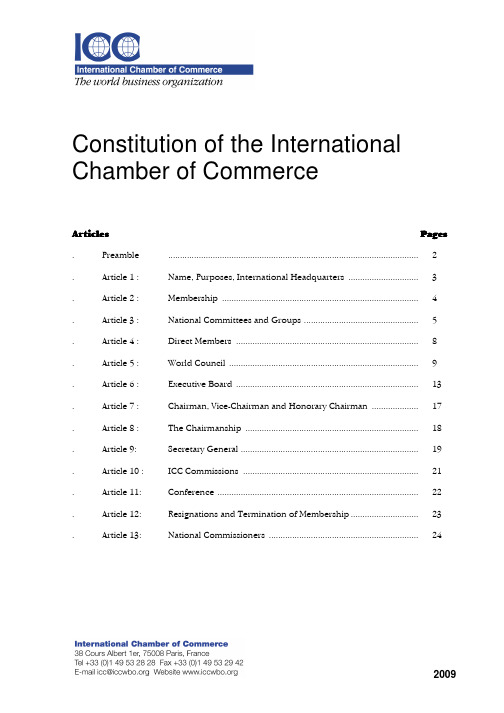
2009Constitution of the International Chamber of CommerceArticlesPages . Preamble ........................................................................................................... 2 . Article 1 : Name, Purposes, International Headquarters .............................. 3 . Article 2 : Membership .................................................................................... 4 . Article 3 : National Committees and Groups ................................................. 5 . Article 4 : Direct Members .............................................................................. 8 . Article 5 : World Council ................................................................................. 9 . Article 6 : Executive Board .............................................................................. 13 . Article 7 : Chairman, Vice-Chairman and Honorary Chairman .................... 17 . Article 8 : The Chairmanship .......................................................................... 18 . Article 9: Secretary General ............................................................................ 19 . Article 10 : ICC Commissions ........................................................................... 21 . Article 11: Conference ...................................................................................... 22 . Article 12: Resignations and Termination of Membership............................. 23 . Article 13:National Commissioners ................................................................24PreambleWhereas the fundamental objective of the International Chamber of Commerce, founded in 1919, is to further the development of an open world economy with the firm conviction that international commercial exchanges are conducive to both greater global prosperity and peace among nations,Whereas all the activities of the International Chamber of Commerce, whether of a policy or technical nature, aim:- to promote international trade, services and investment, while eliminating obstacles and distortions to international commerce;- to promote a market economy system based on the principle of free and fair competition among business enterprises;- to foster the economic growth of developed and developing countries alike, particularly with a view to better integrate all countries into the world economy;Whereas the International Chamber of Commerce is committed to fighting protectionism in all its forms, expanding the international flow of goods, services, capital and technology, making policy recommendations on a wide range of international issues and translating its principles into practical services to the business community to facilitate commercial exchanges across frontiers; andWhereas the International Chamber of Commerce is also convinced of the paramount need of enhancing the respect of high standards, equity and good faith in international professional and business relationships;Therefore, it is governed by the following Constitution:2Name, Purposes, International Headquarters1. The Organisation is called International Chamber of Commerce, also known as the"World Business Organisation" or by the acronym "ICC".2. ICC brings together the various economic sectors in market economy countries andacts to:a. represent trade, industry, finance, transport, insurance and, in general, all sectorsof international business;b. ascertain the views of corporations, companies, organisations, firms andindividuals involved in international trade and related business operations andvoice them to the relevant intergovernmental institutions and, through itsNational Committees, Groups and Direct Members, to their governments andother bodies in their respective countries;c. assure effective and consistent action in the economic and legal fields in order tocontribute to the harmonious growth and the freedom of internationalcommerce;d. provide practical and expert services to the international business community;e. encourage effective rapprochement and cooperation among businessmen*indifferent countries and among the organisations that bring them together.3. Since its foundation in 1919, the seat and the International Headquarters of ICC havebeen located in Paris.* Throughout this Constitution, words that import the masculine gender include the feminine gender.3Membership1. ICC is composed of members sharing the objectives as set forth in the Preamble andcontributing to its purposes stated in Article 1.2.2. a. Provided that they belong to a National Committee or a Group, the following areeligible for ICC membership:- national and local organisations which are truly representative of the business and professional interests of their members and which are notconducted primarily for political purposes;- corporations, companies, firms and other legal entities as well as individuals involved in international business activities.b. In the absence of a National Committee or a Group, it is possible to become amember in accordance with the rules set forth in Article 4 hereafter.3. The notification by a National Committee of the fact that organisations, legal entitiesand individuals belong to it results in their membership in ICC, unless the World Council objects to such membership at its next meeting. All members of ICC shall be entered on a register maintained by the International Headquarters.4National Committees and GroupsSubject to the provisions of Article 2.3. hereof,1. When the organisations, legal entities and individuals referred to in Article2.2.a.represent the main economic sectors of their country, they may establish a National Committee of ICC by signing the Charter between the ICC World Council and the National Committee [Group]. The articles of association of a National Committee must be approved by the World Council. Their precise names are left to the discretion of their members, provided that their relationship with ICC is clearly indicated on their letterhead, publications and documentation.2. Prior consultation with, and approval by, the World Council are prerequisite conditionsfor the establishment of a National Committee. The withdrawal by the World Council of its recognition as a National Committee is a prerequisite condition for its dissolution.3. Subject to the provisions of this Article and the Charter, National Committees [Groups]freely establish their own rules.4. In its country the National Committeea. acts as a permanent liaison between International Headquarters and ICCmembers in their countries, notably by representing them vis-à-vis ICC, inparticular in connection with World Council meetings and their representation atsuch meetings;b. organizes activities intended to make known the work of ICC in general, and asappropriate, in coordination with International Headquarters;c. works to mobilize, formulate and advocate the views of the business communityin its country on the issues dealt with by ICC; it informs ICC on important issuesand views affecting the business community of its country;d. appoints delegates to the Commissions of ICC;5e. provides services and information responsive to the needs of ICC members andthe business community in its country;f. promotes the adoption and implementation of the policies advocated by ICC bythe governmental authorities, administrative agencies and other institutions witha view to their implementation in its country;g. strives, by all appropriate means, to promote a better understanding and agreater application of the rules, codes, uniform commercial usages and practicesestablished by ICC.5. a. Each National Committee is empowered by its ICC members to select adelegation to represent them at the World Council and to cast the number ofvotes to which they are entitled in accordance with Article 5.4.a. This delegationconstitutes the representation of the National Committee at the World Council.In the absence of such a delegation, each National Committee may appoint aproxy in accordance with Article 5.5.b to represent its ICC members.b. Each National Committee must have available an administrative structure tofacilitate the active participation of the members of ICC in its country in theactivities of ICC. Should a National Committee no longer be able to meet thiscondition, the World Council may take such measures as it may deem necessaryto ensure proper communication with ICC members in the country in question.6. Each National Committee sets its membership fees so as to enable it to meet its ownoperational expenses as well as its financial obligations vis-à-vis ICC. Article 5.3. a.applies to a National Committee which does not fulfil such obligations.7. Each National Committee shall communicate to International Headquarters its annualbalance sheet and a statement of its income and expenses.8. When a National Committee is declared inactive or dissolved, its members may becomeDirect Members in accordance with Article 4.1.69. The permanent heads in charge of the day-to-day operation of National Committeesshall meet at least once a year, normally at the International Headquarters. The permanent heads are called to such meetings by the Secretary General who also establishes the agenda.10. When conditions so require, founders referred to in Article 3.1. may form a Group on anational or regional basis. By decision of the World Council taken by a majority of two thirds, such a Group may become entitled to participate in the meetings of the World Council and in the work of the working bodies and commissions of ICC. The modalities for such participation and the rights of the various recognized Groups shall be defined on a case-by-case basis. In the absence of specific provisions, a Group shall be considered as a National Committee, in particular with respect to this Article. In or for any given country, either a National Committee or a Group can exist, but not both.7Direct Members1. Where no National Committee or Group exists, the World Council may accept theorganizations, legal entities and individuals referred to in Article 2.2.a., as Direct Members, upon proposal of the Executive Board.2. Direct Members may participate in ICC Conferences upon invitation by the Chairman.3. They are kept informed of the work of ICC through appropriate documentation.4. Upon proposal of the Secretary General, the World Council may decide to associate aDirect Member to the work of any ICC Commission.5. Direct Members may participate in the meetings of the World Council, it beingunderstood that together they shall be represented by a delegation of no more than ten persons and that due consideration shall be given to their geographical representation.The persons making up this delegation are appointed yearly by the World Council, upon proposal of the Chairman.6. The delegation representing the Direct Members shall designate one delegate to castthe number of votes to which they are entitled pursuant to Article 5.4.a.8World Council1. The members of ICC, assembled in an Annual General Meeting in accordance with theconditions mentioned below, constitute the World Council, the supreme authority of ICC. The World Council ensures the implementation of the provisions of this Constitution and the Charter and exercises all the prerogatives with which it is vested.2. Its meetings shall be chaired by the Chairman.3. The World Council has the following prerogatives:a. upon recommendation of the Executive Board:- it elects the Chairman, the Vice-Chairman, the Chairman of the International Court of Arbitration and members of the Executive Board;- it appoints the Secretary General;- it establishes and varies the scale and amounts of contributions of National Committees and contributions of Direct Members;- it approves the annual accounts;- it amends the Constitution of ICC and the Charter;- it approves in principle the establishment of new National Committees and it authorizes their founders to take the necessary measures for theirestablishment; it approves their Articles of Association;- it accepts Direct Members;9-it approves the withdrawal of recognition of a National Committee, including the prohibition to use the name and all distinctive signs of ICC, should aNational Committee not fulfil its obligations towards ICC; and recognises thedissolution of the National Committee; and- it approves the creation and termination of ICC working bodies, the existing ones being the International Court of Arbitration, the World ChambersFederation and the Institute of World Business Law;b. it appoints the Vice-Chairmen of the International Court of Arbitration;c. it appoints the members of the International Court of Arbitration, on theproposal of National Committees;d. it ratifies the election of the Chairman of the ICC World Chambers Federation;e. it delegates the necessary powers to the Executive Board for the discharge of itsoverall duties;f. it takes major decisions concerning ICC assets, in accordance with applicable law;g. it appoints the external auditors.4. a. The number of votes that may be cast by the delegation of a National Committeeor its authorized proxy is fixed as follows:- three votes for each National Committee paying three per cent or more of the total amount of contributions from National Committees to the ICCbudget;- two votes for each National Committee paying three quarters of one per cent or more but less than three per cent of the total amount of contributionsfrom National Committees to the ICC budget;- one vote for each other National Committee;- one vote for Direct Members taken together.10b. Quorum shall be one third of the total votes that may be cast; however fordecisions concerning any amendment of the Constitution or the dissolution ofICC, the quorum shall be one half.c. The decisions of the World Council shall be taken by a majority of the votes castby the delegations and proxies, except with regard to the following matters whichshall be decided by a majority of two thirds:- any change to the scale and amounts of the contributions of National Committees to the budget of ICC;- interpretation or amendment of the Constitution of ICC;- recognition or withdrawal of recognition of National Committees;- termination of the membership of an ICC member pursuant to article 12.4.5. a. National Committees shall notify the International Headquarters of the name(s)of the delegate(s) selected in accordance with Article 3.5.a.; such notificationshall avail for three-year renewable terms, each commencing on 1 January.National Committees shall inform the International Headquarters of changes inthe composition of the delegation, which may occur during any three-year-term,at least three weeks prior to the World Council meeting at which such change isto take effect. National Committees may appoint one or more alternates , withinthe same limits and in accordance with the same notification procedure.b. The proxy is validly authorized by a National Committee or by Direct Memberswhen the instrument of proxy appoints the Chairman or a National Committee;no National Committee can exercise more than three proxies. Proxies must bereceived by the Secretary General at the International Headquarters at least eightcalendar days prior to the date of the World Council meeting.6. In addition to the delegates accredited by the National Committees and delegates ofDirect Members, the following persons attend ex-officio the meetings of the World Council:- the Chairman- the Vice-Chairman- the Honorary Chairman- the Chairmen of the Committees of the Executive Board;- the Chairman of the International Court of Arbitration;- the Chairman of the ICC World Chambers Federation.The ex-officio members have no voting rights, unless they are appointed as accredited delegates or unless the Chairman holds a proxy.7. a. The World Council, acting as the Annual General Meeting of ICC, shall beconvened once a year by the Chairman following the closing of the accounts. TheChairman can also convene the World Council for extraordinary meetings uponrequests emanating from at least ten National Committees.b. The Secretary General shall attend all meetings of the World Council and be itsSecretary.c. The meetings of the World Council are convened upon at least six weeks' noticeby the Chairman who shall establish its agenda. At the request of at least tenNational Committees, the agenda shall include any issue that those nationalCommittees consider to be of major concern to the organization as a whole.Notices of the meeting and the agenda are validly communicated whenforwarded to National Committees and, as the case may be, to the Groups andDirect Members concerned.Article 6Executive Board1.The Executive Board is responsible for developing and implementing the strategy,policy and programme of action of ICC as well as for overseeing the financial affairs ofICC. It is vested for these purposes with all the necessary powers.2. a. The Executive Board is composed of twenty-four members comprising ex officioand elected members, each having equal rights.b. The ex officio members are the Chairman, the Vice-Chairman, the HonoraryChairman, the Secretary General, the Chairman of the International Court ofArbitration, the Chairman of the ICC World Chambers Federation, and theChairman of the World Business Council for Sustainable Development.c.The other seventeen members shall be elected by the World Council, uponrecommendation of the Executive Board, from among the following fourcategories:(i)nine senior businessmen, having a sound knowledge of ICC, proposed byNational Committees from among their members to the Nominations andHuman Resources Committee of the Executive Board;(ii)four individuals, being corporate heads or corporate board members representing a company which is, or becomes forthwith, a member of ICC,proposed to the Nominations and Human Resources Committee of theExecutive Board by any interested body or person;(iii)two individuals having the qualities and characteristics described in either of the preceding categories; and(iv)two representatives, with proven business experience, of chambers in ICC membership proposed by the ICC World Chambers Federation to theNomination and Human Resources Committee of the Executive Board.d.The term of office of the elected members of the Executive Board is three years.3. a. The Executive Board is, in particular, responsible for:-recommending for election by the World Council the Chairman, the Vice-Chairman, the Chairman of the International Court of Arbitration, andmembers of the Executive Board;-proposing organisations, legal entities and individuals referred to in Article2.2.a for acceptance by the World Council as Direct Members;-submitting the election of the Chairman of the ICC World Chambers Federation for ratification by the World Council;-recommending to the World Council the appointment of the Secretary General;-appointing the members of the Committees of the Executive Board upon proposal by the Nominations and Human Resources Committee;-adopting ICC's annual budget;-proposing to the World Council the scale and amounts of the contributions of National Committees and Direct Members;-submitting to the World Council the annual accounts for approval;-deciding on possible sources for external financing ;-overseeing periodic reviews of Charter implementation with a view to creating a stronger global network of National Committees;-deciding on the suspension of services to and voting rights of National Committees;-recommending to the World Council the recognition and withdrawal of recognition of National Committees;-recommending to the World Council the creation and termination of ICC working bodies, the existing ones being the International Court ofArbitration, the World Chambers Federation and the Institute of WorldBusiness Law;-approving modifications to the terms of reference of ICC working bodies;-establishing, terminating and merging ICC Commissions as well as extending the term of their mission otherwise limited to five years;-approving all ICC policy documents;-ensuring the maintenance of high quality and relevance of ICC Commission activities.b. The Executive Board may delegate some of its powers to the Chairmanship.4. By delegation, the Executive Board acts on behalf of the World Council on all urgentmatters which may arise between World Council meetings.5. The Executive Board shall meet four times a year, or more if so requested by theChairman or by at least six of its members; when a member is prevented from attendinga meeting in person, he may participate by means of teleconferencing. The Chairmanshall convene and chair the meetings and fix their provisional agendas.6. In the absence of a consensus, the decisions of the Executive Board shall be taken by atwo thirds majority of the members participating in the meeting.7. At the annual World Council meeting, the Chairman and the Secretary General, onbehalf of the Executive Board, shall report to the World Council on the various activities and decisions of ICC working bodies and commissions, and on the situation of ICC.8. a. The Executive Board establishes Committees to help it fulfil its responsibilities.The current Committees of the Executive Board are:Nominations and HumanResources, Finance, National Committees, and Policy and Commissions. TheCommittees can be terminated, except for the Finance Committee which ispermanent, and new ones can be established by the Executive Board at itsdiscretion;b. The Committees of the Executive Board provide support and advice to theExecutive Board. As such, they are responsible for reviewing and preparingmaterial for the Executive Board, each in the area of their competence and inconjunction with other interested Committees as the case may be;c.The members of the Committees of the Executive Board are appointed mainlyfrom among its members but also from outside considering the advisability of associating personalities with specific competence, except for the Nominations and Human Resources Committee whose members must all be chosen from members of the Executive Board;d. Upon proposal of the Chairmanship, the Executive Board appoints, from amongits members, the chairman of each Committee of the Executive Board.Chairman, Vice-Chairman and Honorary Chairman1. The Chairman holds the highest office in ICC, and, in this capacity, represents ICCtowards third parties. He presides over the meetings of the Chairmanship, the Executive Board and the World Council.2. The Chairman appoints the Chairmen and Vice-Chairmen of all ICC Commissions.3. The Vice-Chairman shall assist the Chairman in the discharge of his responsibilities. TheChairman may delegate certain of his responsibilities to the Vice-Chairman. In the event of the death or resignation of the Chairman, or should he become for any other reason unable to discharge the duties of his office, the Vice-Chairman shall replace him and assume all his rights and responsibilities..4. Every second year, the World Council shall elect the Chairman and the Vice-Chairmanfor a period of two years commencing the following 1 July.5. The Vice-Chairman shall in principle succeed the Chairman.6. For a period of two years following the end of his term of office, the Chairman, asHonorary Chairman, shall be an ex-officio member of the Executive Board and of the World Council. This mandate may be reduced to one year at the request of the incumbent.The Chairmanship1. The Chairman, the Vice-Chairman and the Honorary Chairman constitute theChairmanship, which is presided over by the Chairman.2.The Chairmanship:-formulates proposals for ICC's strategy, policy and programme of action for determination by the Executive Board;-proposes the Chairmen of the Committees of the Executive Board for appointment by the Executive Board.3. To ensure the effective functioning of ICC, the Chairmanship is entrusted with the rightto act on behalf of the Executive Board between meetings of the Executive Board; the Chairman as head of the Chairmanship shall report regularly to the Executive Board.4. The Chairmanship shall meet as often as necessary, and more particularly whenever animportant matter has to be dealt with urgently.5. The Secretary General acts as Secretary of the Chairmanship.Secretary General1. a. The Secretary General is appointed by the World Council upon recommendationof the Executive Board;b. The Executive Board assesses periodically the performance of the SecretaryGeneral, taking into account in particular the current policies and theprogrammes, and makes appropriate recommendations.2. The Secretary General administers the affairs of ICC and implements its policy withinthe framework defined by the Executive Board. The Secretary General is, in particular, responsible for the implementation of the strategic and policy decisions taken by the Executive Board and the programme of action. He also develops proposals for ICC policy and rule-setting projects for consideration by the Chairmanship and then by the Executive Board.3. The Secretary General manages ICC's finances and implements the budget on a day-to-day basis to ensure efficient use of ICC resources in accordance with the decisions taken by the Executive Board.4. The Secretary General has authority, within the budget, to recruit and to manage all thestaff of ICC.5. The Executive Board may delegate such power as it deems necessary to the SecretaryGeneral to perform his duties. The Secretary General reports thereon to the Executive Board.6. The Secretary General is ex-officio Secretary of the World Council, of the ExecutiveBoard and of the Chairmanship. He provides support to, and coordinates the activities of, the World Council, the Executive Board, the Chairmanship and the Committees of the Executive Board to enable them to fulfil their responsibilities.7. The Secretary General is charged with developing and maintaining strong workingrelations with international organisations, both governmental and non-governmental,that are relevant to ICC's activities. The Secretary General appoints ICC representatives to conferences and other events to which ICC is invited and which are beneficial to its work.8. The Secretary General maintains close contact with National Committees, in particularby calling the meeting referred to in Article 3.9., monitors their activities and reports thereon to the Executive Board. He ensures proper coordination for an efficient working relationship between the National Committees and ICC's International Headquarters. The Secretary General keeps a record of the admissions and deletions of the members of ICC as communicated by National Committees.9. If by reason of death, long-term disability or resignation, the Secretary General can nolonger fulfil his function, the Chairman takes all necessary measures, after having consulted and sought such advice as he deems appropriate, with a view to finding an interim solution.。
icc是什么意思的缩写

icc是什么意思的缩写icc的缩写是The International Chamber of Commerce,意思为国际商会。
该商会成立于1919年,发展至今已拥有来自130多个国家的成员公司和协会,是全球唯一的代表所有企业的权威代言机构。
一、icc是什么icc全称The International Chamber of Commerce,中文名ICC国际商会,成立于1919年,发展至今已拥有来自130多个国家的成员公司和协会,是全球唯一的代表所有企业的权威代言机构。
它是以贸易为促进和平、繁荣的强大力量,推行一种开放的国际贸易、投资体系和市场经济。
由于国际商会的成员公司和协会本身从事于国际商业活动,因此它所制定用以规范国际商业合作的规章,如:《托收统一规则》、《跟单信用证统一惯例》、《国际商会2010国际贸易术语解释通则》等被广泛地应用于国际贸易中,并成为国际贸易不可缺少的一部分,国际商会属下的国际仲裁法庭是全球最高的仲裁机构,它为解决国际贸易争议起着重大的作用。
二、icc的性质及职能国际商会是为世界商业服务的非政府间组织,是联合国等政府间组织的咨询机构。
基本目的是为开放的世界经济服务,坚信国际商业交流将导致更大的繁荣和国家之间的和平。
主要职能有四个,分别如下:1、在国际范围内代表商业界,特别是对联合国和政府专门机构充当商业发言人;2、促进建立在自由和公正竞争基础上的世界贸易和投资;3、协调统一贸易惯例,并为进出口商制定贸易术语和各种指南;4、为商业提供实际服务.服务包括:设立解决国际商事纠纷的仲裁院、协调和管理货物临时免税进口的ATA单证册制度的国际局、商业法律和实务学会、反海事诈骗的国际海事局、反假冒商标和假冒产品的反假冒情报局、为世界航运创造市场条件的海事合作中心和经常组织举办各种专业讨论会和出版发行种类广泛的出版物。
icc名词解释
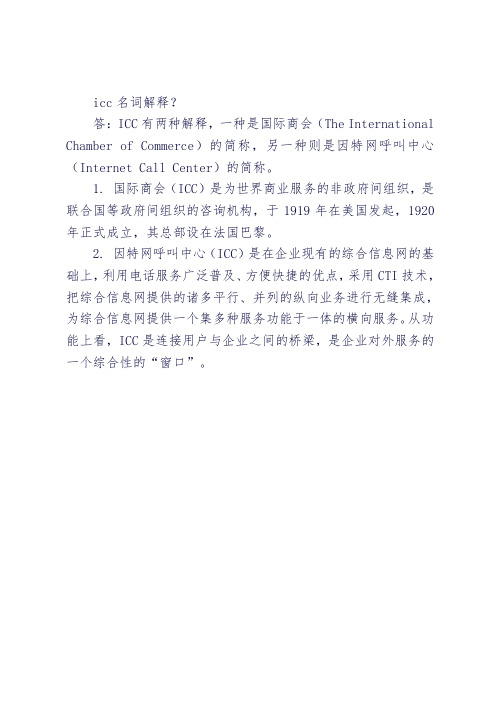
icc名词解释?
答:ICC有两种解释,一种是国际商会(The International Chamber of Commerce)的简称,另一种则是因特网呼叫中心(Internet Call Center)的简称。
1. 国际商会(ICC)是为世界商业服务的非政府间组织,是联合国等政府间组织的咨询机构,于1919年在美国发起,1920年正式成立,其总部设在法国巴黎。
2. 因特网呼叫中心(ICC)是在企业现有的综合信息网的基础上,利用电话服务广泛普及、方便快捷的优点,采用CTI技术,把综合信息网提供的诸多平行、并列的纵向业务进行无缝集成,为综合信息网提供一个集多种服务功能于一体的横向服务。
从功能上看,ICC是连接用户与企业之间的桥梁,是企业对外服务的一个综合性的“窗口”。
法国广告自律研究(3):ARPP的自律职能实施模式管理
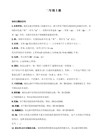
为了解和改进自律成效,专职广告审查局(ARPP)会定期开展调研和咨询。比如2005年,“都市论坛”的讨论主题是“广告?暴力?攻击性和粗俗”,2006年的主题是“多样性、整合与广告”,2007年的主题是“广告与环境保护:对法国的认识与展望”。
关于“广告中的人物形象”(Picture of the human person in advertising )研究则是专职广告审查局(ARPP)的长期调研项目,每年都会公布研究结果。此外,“广告与可持续发展”(Advertising and Sustainable Development)或“广告与环境”(Advertising and Environment )也是研究重点。
专职广告审查局(ARPP)的广告自律活动不只是被动接受投诉,其工作人员会主动地进行广告监督,即介入与干涉已经发布的问题广告。主要采用的方式是对问题比较多的领域进行连续的、系统的抽样分析。一旦 ARPP自己发现或者接到受众向广告道德评审委员会(JDP)投诉, ARPP将会介入并启动监管职能、展开调查,并就处理结果进行公布。
为了避免法律纠纷如来自广告主的法律诉讼,专职广告审查局(ARPP)一般会对媒体说“这只是在案件最终提交法院之前的建议性措施”。当然,在这种情况下,ARPP极少会遇到法律麻烦。不过一旦出现这种情况,ARPP最终还是会诉诸法院,同时会象征性地主张一些赔偿,尤其是涉及药品、医疗和医疗器械等产品的广告。大多情况下,法院都会支持ARPP的裁决,而很少直接动用国家法律,重新审判。
六、自我推广和专题调研
为配合自律职能的实施,自律组织常常会开展一些宣传活动,以提高社会对专职广告审查局(ARPP)的组织认知度和组织的影响力,提高社会信任和支持,以争取更多机会介入广告监管。
国际商会ICC
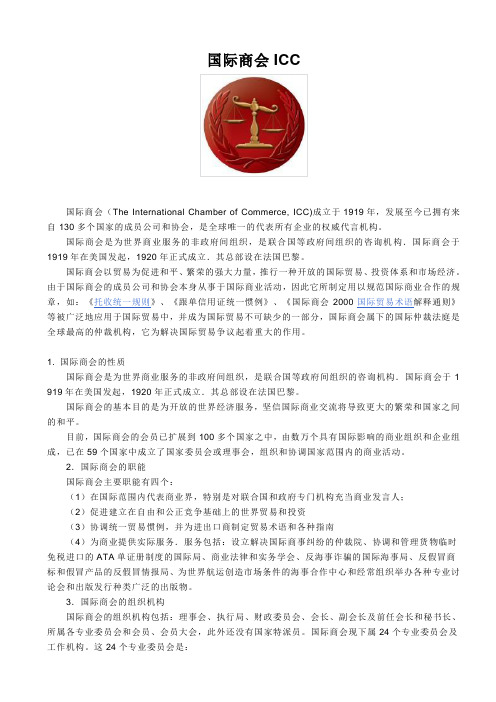
国际商会ICC国际商会(The International Chamber of Commerce, ICC)成立于1919年,发展至今已拥有来自130多个国家的成员公司和协会,是全球唯一的代表所有企业的权威代言机构。
国际商会是为世界商业服务的非政府间组织,是联合国等政府间组织的咨询机构.国际商会于1919年在美国发起,1920年正式成立.其总部设在法国巴黎。
国际商会以贸易为促进和平、繁荣的强大力量,推行一种开放的国际贸易、投资体系和市场经济。
由于国际商会的成员公司和协会本身从事于国际商业活动,因此它所制定用以规范国际商业合作的规章,如:《托收统一规则》、《跟单信用证统一惯例》、《国际商会2000国际贸易术语解释通则》等被广泛地应用于国际贸易中,并成为国际贸易不可缺少的一部分,国际商会属下的国际仲裁法庭是全球最高的仲裁机构,它为解决国际贸易争议起着重大的作用。
1. 国际商会的性质国际商会是为世界商业服务的非政府间组织,是联合国等政府间组织的咨询机构.国际商会于1 919年在美国发起,1920年正式成立.其总部设在法国巴黎。
国际商会的基本目的是为开放的世界经济服务,坚信国际商业交流将导致更大的繁荣和国家之间的和平。
目前,国际商会的会员已扩展到100多个国家之中,由数万个具有国际影响的商业组织和企业组成,已在59个国家中成立了国家委员会或理事会,组织和协调国家范围内的商业活动。
2.国际商会的职能国际商会主要职能有四个:(1)在国际范围内代表商业界,特别是对联合国和政府专门机构充当商业发言人;(2)促进建立在自由和公正竞争基础上的世界贸易和投资(3)协调统一贸易惯例,并为进出口商制定贸易术语和各种指南(4)为商业提供实际服务.服务包括:设立解决国际商事纠纷的仲裁院、协调和管理货物临时免税进口的ATA单证册制度的国际局、商业法律和实务学会、反海事诈骗的国际海事局、反假冒商标和假冒产品的反假冒情报局、为世界航运创造市场条件的海事合作中心和经常组织举办各种专业讨论会和出版发行种类广泛的出版物。
有关国际商会国际销售示范合同 ICC3篇

有关国际商会国际销售示范合同ICC3篇篇1国际商会国际销售示范合同(ICC)是指根据国际商会(International Chamber of Commerce,简称ICC)制定的一种标准合同,在国际贸易中被广泛应用。
ICC是一个非政府组织,成立于1919年,总部位于法国巴黎,其使命是促进国际商业活动的发展,促进公平贸易和投资,以及解决国际商业纠纷。
国际销售示范合同是ICC推出的一项重要工具,旨在为参与国际贸易的各方提供一个统一、灵活和适用的合同模板,以规范双方之间的交易关系,减少纠纷的发生。
该合同涵盖了各种重要条款和条款,如商品描述、价格、交付方式、付款条件、风险转移、违约责任、争议解决等,以确保交易双方的权利和义务得到充分保障。
国际销售示范合同的制定经过了长期的磋商和专家意见的整合,因此具有较高的权威性和可操作性。
企业在与海外客户进行合作时,可根据ICC的示范合同进行调整和修改,以满足双方的具体需求和利益,同时保证合同的合法性和有效性。
通过采用国际销售示范合同,企业可以享受到以下几方面的好处:首先,国际销售示范合同提供了一个系统完整的合同模板,帮助企业避免繁琐的合同起草过程,节省了时间和资源。
企业只需根据实际情况填写必要的信息即可,避免了可能出现的纰漏和遗漏。
其次,国际销售示范合同涵盖了各种关键条款和条件,帮助企业规避风险、保护自身利益。
例如,在合同中明确约定商品的规格、质量要求,可以减少因质量问题引起的纠纷;规定付款方式和期限,可以杜绝付款风险。
再次,国际销售示范合同是ICC在全球范围内通行的合同模板,得到了国际社会的广泛认可和尊重。
采用这种合同,可以增强企业的国际形象和信誉,提高与海外客户的合作效率。
最后,国际销售示范合同提供了专业的争议解决机制,帮助企业在发生纠纷时快速、有效地解决问题。
ICC拥有专业的仲裁团队和解决纠纷的流程,可为企业提供公平、公正的仲裁服务,确保纠纷能够及时得到解决。
国际商会广告与营销传播实务统一准则(2011 年)英文版

Consolidated ICC Code
Preface
Jean-Guy Carrier
ICC Secretary General ir, ICC Marketing
Table of contents
Introduction.............................................................................................. 1
Responsible advertising and marketing communications....................................... 1 The Code................................................................................................... 1 Significant changes...................................................................................... 2 Purpose of the Code.................................................................................... 2 Structure of the Code................................................................................... 3 Scope of the Code and definitions................................................................... 3 Interpretation.............................................................................................. 5 Cross-border communications - origin and jurisdiction......................................... 5
cto外贸术语
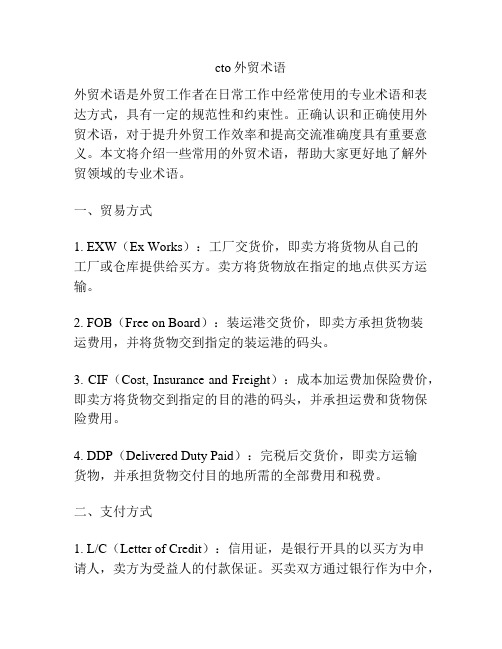
cto外贸术语外贸术语是外贸工作者在日常工作中经常使用的专业术语和表达方式,具有一定的规范性和约束性。
正确认识和正确使用外贸术语,对于提升外贸工作效率和提高交流准确度具有重要意义。
本文将介绍一些常用的外贸术语,帮助大家更好地了解外贸领域的专业术语。
一、贸易方式1. EXW(Ex Works):工厂交货价,即卖方将货物从自己的工厂或仓库提供给买方。
卖方将货物放在指定的地点供买方运输。
2. FOB(Free on Board):装运港交货价,即卖方承担货物装运费用,并将货物交到指定的装运港的码头。
3. CIF(Cost, Insurance and Freight):成本加运费加保险费价,即卖方将货物交到指定的目的港的码头,并承担运费和货物保险费用。
4. DDP(Delivered Duty Paid):完税后交货价,即卖方运输货物,并承担货物交付目的地所需的全部费用和税费。
二、支付方式1. L/C(Letter of Credit):信用证,是银行开具的以买方为申请人,卖方为受益人的付款保证。
买卖双方通过银行作为中介,实施货款的结算和交付。
2. T/T(Telegraphic Transfer):电汇,是一种通过银行的电子转账方式,将货款从买方的银行账户转入卖方的银行账户。
3. D/A(Documents Against Acceptance):承兑交单,即买方在指定时间内承兑并支付汇票的方式进行货款结算。
4. D/P(Documents Against Payment):付款交单,即买方在签收货物的同时支付货款。
三、国际贸易术语1. Incoterms(International Commercial Terms):国际贸易术语,是国际商会颁布的适用于国际商务的国际贸易术语规则,旨在统一全球贸易中各方之间的义务和责任。
2. MOQ(Minimum Order Quantity):最低起订量,即在订单中规定的最低销售数量。
icc仲裁规则2021
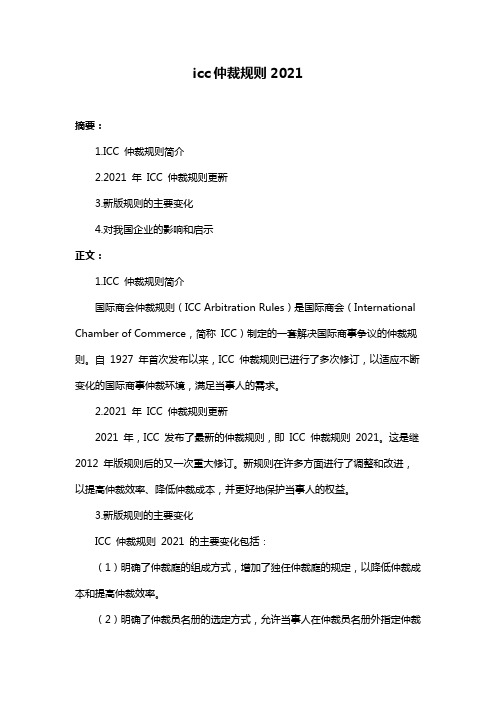
icc仲裁规则2021摘要:1.ICC 仲裁规则简介2.2021 年ICC 仲裁规则更新3.新版规则的主要变化4.对我国企业的影响和启示正文:1.ICC 仲裁规则简介国际商会仲裁规则(ICC Arbitration Rules)是国际商会(International Chamber of Commerce,简称ICC)制定的一套解决国际商事争议的仲裁规则。
自1927 年首次发布以来,ICC 仲裁规则已进行了多次修订,以适应不断变化的国际商事仲裁环境,满足当事人的需求。
2.2021 年ICC 仲裁规则更新2021 年,ICC 发布了最新的仲裁规则,即ICC 仲裁规则2021。
这是继2012 年版规则后的又一次重大修订。
新规则在许多方面进行了调整和改进,以提高仲裁效率、降低仲裁成本,并更好地保护当事人的权益。
3.新版规则的主要变化ICC 仲裁规则2021 的主要变化包括:(1)明确了仲裁庭的组成方式,增加了独任仲裁庭的规定,以降低仲裁成本和提高仲裁效率。
(2)明确了仲裁员名册的选定方式,允许当事人在仲裁员名册外指定仲裁员,增加了当事人的自主权。
(3)增设了紧急仲裁员制度,以便在紧急情况下迅速解决争议。
(4)增加了临时措施的规定,使仲裁庭可以更有效地协助当事人维护其权益。
(5)明确了电子文件的接受和采纳,以适应现代商务的电子化趋势。
(6)简化了仲裁程序,减少了不必要的程序环节,降低了仲裁费用。
4.对我国企业的影响和启示ICC 仲裁规则2021 的修订对我国企业在国际商事仲裁中具有重要的影响。
我国企业应关注这些变化,并在签订国际合同时充分考虑适用ICC 仲裁规则,以便更好地保护自身权益。
具体而言,我国企业可以从以下几个方面着手:(1)加强对ICC 仲裁规则的学习和了解,掌握新规则的具体内容和适用方法。
(2)在与外商签订合同时,积极争取适用ICC 仲裁规则,以便在争议发生时获得更公正、高效的仲裁服务。
(3)在选择仲裁员时,充分利用ICC 仲裁员名册外的指定方式,挑选熟悉我国法律和行业情况的仲裁员,以便在仲裁过程中更好地维护我国企业的权益。
国际商会 icc
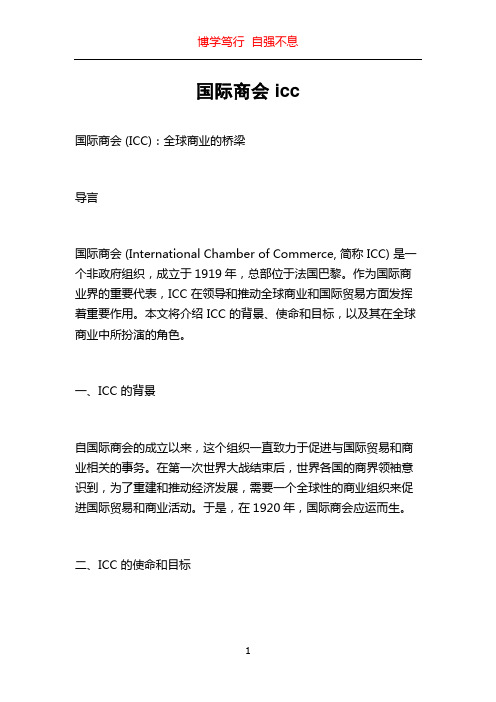
国际商会 icc国际商会 (ICC):全球商业的桥梁导言国际商会 (International Chamber of Commerce, 简称 ICC) 是一个非政府组织,成立于1919年,总部位于法国巴黎。
作为国际商业界的重要代表,ICC 在领导和推动全球商业和国际贸易方面发挥着重要作用。
本文将介绍 ICC 的背景、使命和目标,以及其在全球商业中所扮演的角色。
一、ICC 的背景自国际商会的成立以来,这个组织一直致力于促进与国际贸易和商业相关的事务。
在第一次世界大战结束后,世界各国的商界领袖意识到,为了重建和推动经济发展,需要一个全球性的商业组织来促进国际贸易和商业活动。
于是,在1920年,国际商会应运而生。
二、ICC 的使命和目标ICC 的使命是通过建立和维护公平和开放的全球商业环境,促进可持续经济增长和就业。
为了实现这一使命,ICC 设定了以下目标:1. 促进国际贸易:ICC 的首要目标之一是推动国际贸易的增长和发展。
该组织通过制定国际贸易规则和标准来引导和支持贸易活动,促进各国之间的合作和交流。
2. 制定商业政策:ICC 与各国政府合作,制定符合商业利益的政策和法规。
该组织通过就业、环境、知识产权等议题,为全球商业界提供准确、可行的政策建议,以推动商业和经济的可持续发展。
3. 解决商业争端:ICC 在解决商业争端方面发挥着重要作用。
该组织设立了国际商事法庭,提供有效和独立的商业争端解决机制,帮助各方解决纠纷,并维护商业合作的稳定和可靠性。
4. 促进可持续发展:ICC 关注可持续发展问题,并推动全球商业界采取更加可持续的商业模式和做法。
该组织致力于促进低碳经济发展、推动环保技术创新,并鼓励企业承担更多的社会责任。
三、ICC 在全球商业中的角色ICC 在全球商业中扮演着关键的角色,主要体现在以下几个方面:1. 建立国际商业标准:ICC 制定了许多重要的国际商业标准,例如《国际贸易术语解释》(Incoterms)、《国际商事法典》(Uniform Customs and Practice for Documentary Credits)等。
icc全球发明大赛获奖证书
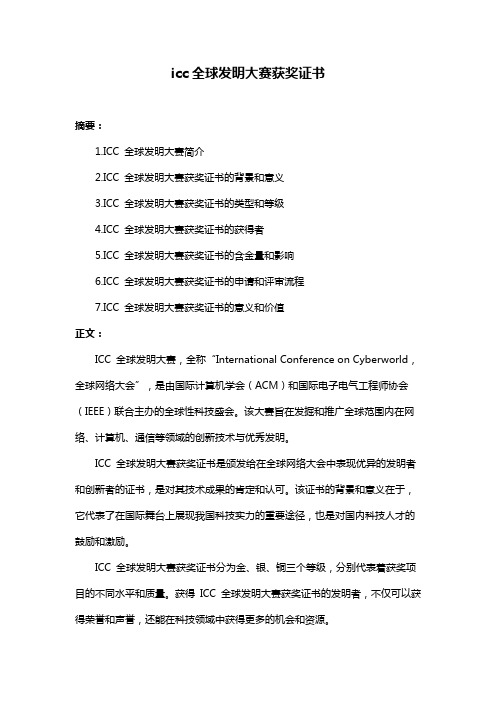
icc全球发明大赛获奖证书摘要:1.ICC 全球发明大赛简介2.ICC 全球发明大赛获奖证书的背景和意义3.ICC 全球发明大赛获奖证书的类型和等级4.ICC 全球发明大赛获奖证书的获得者5.ICC 全球发明大赛获奖证书的含金量和影响6.ICC 全球发明大赛获奖证书的申请和评审流程7.ICC 全球发明大赛获奖证书的意义和价值正文:ICC 全球发明大赛,全称“International Conference on Cyberworld,全球网络大会”,是由国际计算机学会(ACM)和国际电子电气工程师协会(IEEE)联合主办的全球性科技盛会。
该大赛旨在发掘和推广全球范围内在网络、计算机、通信等领域的创新技术与优秀发明。
ICC 全球发明大赛获奖证书是颁发给在全球网络大会中表现优异的发明者和创新者的证书,是对其技术成果的肯定和认可。
该证书的背景和意义在于,它代表了在国际舞台上展现我国科技实力的重要途径,也是对国内科技人才的鼓励和激励。
ICC 全球发明大赛获奖证书分为金、银、铜三个等级,分别代表着获奖项目的不同水平和质量。
获得ICC 全球发明大赛获奖证书的发明者,不仅可以获得荣誉和声誉,还能在科技领域中获得更多的机会和资源。
ICC 全球发明大赛获奖证书的申请和评审流程分为初审、复审和终审三个阶段。
初审阶段,参赛者需要提交项目报告和相关材料,经过专家评审后,进入复审阶段。
在复审阶段,参赛者需要进行现场演示和答辩,最终由评审委员会决定是否通过终审,颁发获奖证书。
ICC 全球发明大赛获奖证书的含金量和影响是巨大的。
获得该证书的发明者,不仅能够提升自身在行业内的地位和影响力,还能推动我国科技事业的发展和进步。
同时,获奖项目也有可能吸引投资和市场关注,从而实现产业化和商业化。
国际通用民法典简写符号
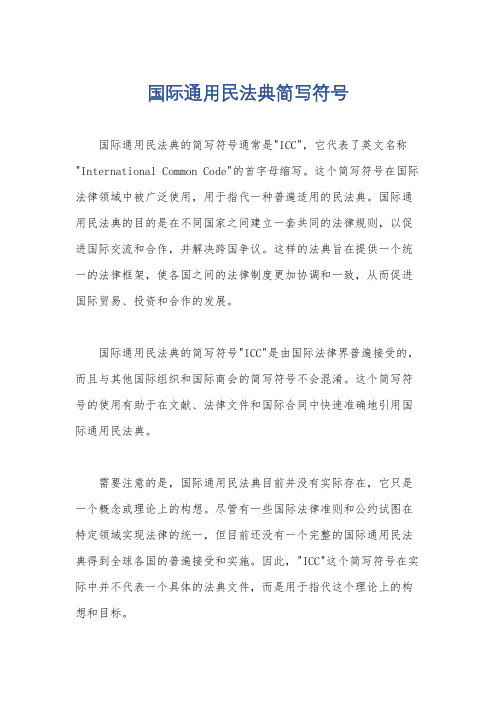
国际通用民法典简写符号
国际通用民法典的简写符号通常是"ICC",它代表了英文名称"International Common Code"的首字母缩写。
这个简写符号在国际法律领域中被广泛使用,用于指代一种普遍适用的民法典。
国际通用民法典的目的是在不同国家之间建立一套共同的法律规则,以促进国际交流和合作,并解决跨国争议。
这样的法典旨在提供一个统一的法律框架,使各国之间的法律制度更加协调和一致,从而促进国际贸易、投资和合作的发展。
国际通用民法典的简写符号"ICC"是由国际法律界普遍接受的,而且与其他国际组织和国际商会的简写符号不会混淆。
这个简写符号的使用有助于在文献、法律文件和国际合同中快速准确地引用国际通用民法典。
需要注意的是,国际通用民法典目前并没有实际存在,它只是一个概念或理论上的构想。
尽管有一些国际法律准则和公约试图在特定领域实现法律的统一,但目前还没有一个完整的国际通用民法典得到全球各国的普遍接受和实施。
因此,"ICC"这个简写符号在实际中并不代表一个具体的法典文件,而是用于指代这个理论上的构想和目标。
总结起来,国际通用民法典的简写符号是"ICC",它代表了一种普遍适用的民法典的概念。
这个简写符号在国际法律领域中被广泛使用,但需要注意的是,目前还没有一个完整的国际通用民法典得到全球各国的普遍接受和实施。
icc全球发明大赛获奖证书
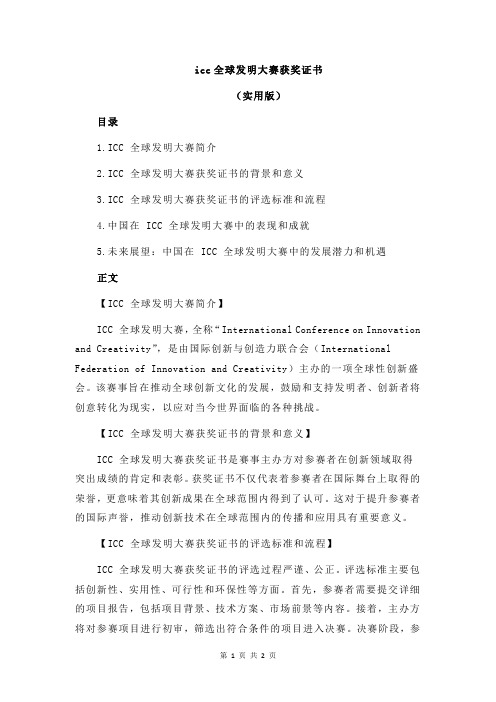
icc全球发明大赛获奖证书(实用版)目录1.ICC 全球发明大赛简介2.ICC 全球发明大赛获奖证书的背景和意义3.ICC 全球发明大赛获奖证书的评选标准和流程4.中国在 ICC 全球发明大赛中的表现和成就5.未来展望:中国在 ICC 全球发明大赛中的发展潜力和机遇正文【ICC 全球发明大赛简介】ICC 全球发明大赛,全称“International Conference on Innovation and Creativity”,是由国际创新与创造力联合会(International Federation of Innovation and Creativity)主办的一项全球性创新盛会。
该赛事旨在推动全球创新文化的发展,鼓励和支持发明者、创新者将创意转化为现实,以应对当今世界面临的各种挑战。
【ICC 全球发明大赛获奖证书的背景和意义】ICC 全球发明大赛获奖证书是赛事主办方对参赛者在创新领域取得突出成绩的肯定和表彰。
获奖证书不仅代表着参赛者在国际舞台上取得的荣誉,更意味着其创新成果在全球范围内得到了认可。
这对于提升参赛者的国际声誉,推动创新技术在全球范围内的传播和应用具有重要意义。
【ICC 全球发明大赛获奖证书的评选标准和流程】ICC 全球发明大赛获奖证书的评选过程严谨、公正。
评选标准主要包括创新性、实用性、可行性和环保性等方面。
首先,参赛者需要提交详细的项目报告,包括项目背景、技术方案、市场前景等内容。
接着,主办方将对参赛项目进行初审,筛选出符合条件的项目进入决赛。
决赛阶段,参赛者需要现场展示自己的创新成果,并接受评委的提问和评议。
最终,评委将根据项目的表现,评选出获奖者并颁发获奖证书。
【中国在 ICC 全球发明大赛中的表现和成就】中国作为 ICC 全球发明大赛的重要参赛国家,历年来在赛事中取得了优异的成绩。
据统计,自赛事创办以来,中国共获得了数百个奖项,其中包括多个金奖。
这些获奖项目涉及电子信息、生物医药、新材料、节能环保等多个领域,充分展示了中国在科技创新方面的实力和潜力。
icc有关的书 -回复
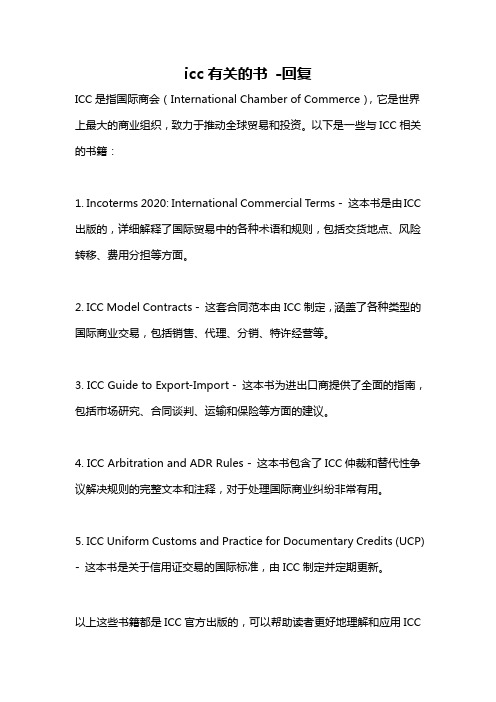
icc有关的书-回复
ICC是指国际商会(International Chamber of Commerce),它是世界上最大的商业组织,致力于推动全球贸易和投资。
以下是一些与ICC相关的书籍:
1. Incoterms 2020: International Commercial Terms - 这本书是由ICC 出版的,详细解释了国际贸易中的各种术语和规则,包括交货地点、风险转移、费用分担等方面。
2. ICC Model Contracts - 这套合同范本由ICC制定,涵盖了各种类型的国际商业交易,包括销售、代理、分销、特许经营等。
3. ICC Guide to Export-Import - 这本书为进出口商提供了全面的指南,包括市场研究、合同谈判、运输和保险等方面的建议。
4. ICC Arbitration and ADR Rules - 这本书包含了ICC仲裁和替代性争议解决规则的完整文本和注释,对于处理国际商业纠纷非常有用。
5. ICC Uniform Customs and Practice for Documentary Credits (UCP) - 这本书是关于信用证交易的国际标准,由ICC制定并定期更新。
以上这些书籍都是ICC官方出版的,可以帮助读者更好地理解和应用ICC
的相关规则和标准。
国际商会联盟 章程 -回复

国际商会联盟章程-回复什么是国际商会联盟,它的章程是如何制定的以及它的作用。
一、什么是国际商会联盟(ICC)?国际商会联盟(International Chamber of Commerce,简称ICC)是一个全球商业组织的国际性联盟,旨在促进国际贸易和投资的自由化和便利化。
成立于1919年,总部设在法国巴黎,是目前全球最大、最有影响力的商业组织之一。
ICC是由来自不同国家的商业组织和企业会员构成,代表了超过130个国家的商业界利益。
其成员涵盖了各个行业和规模的企业,这使得ICC 的声音能够更好地代表全球商业社群。
二、ICC章程的制定过程1. 背景分析ICC的章程制定过程是由其会员组成的一组专家进行协商并最终达成共识。
为了确保章程的全球接受度和适用性,代表不同国家和行业的会员起到了关键作用。
2. 制定目标ICC章程的制定目标是确立一个既能涵盖商业界利益,又能够满足国际合作与发展需要的框架。
该目标是通过提供共同原则和准则来实现全球商业社群的合作与发展。
3. 章程内容ICC章程主要包括以下内容:组织的名称和定位、成员的资格和权益、组织的管理结构、决策机制和程序、各个机构的权力和职责、成员义务和责任等。
章程中还包括ICC的核心价值观和伦理准则,如公平竞争、企业社会责任、合规经营等。
这些原则和准则确保了ICC在服务商业界的同时,也能够维护公共利益和社会责任。
4. 内部审议和批准章程草案在内部进行多次审议和修订,以确保其合法性和可行性。
批准流程包括提交给成员进行讨论和意见征询,最后由成员投票通过。
5. 公告和实施一旦章程获得成员的批准,ICC将通过公告等方式将其正式发布,以便广泛宣传并推动实施。
章程对ICC的日常运作和活动产生重要影响,是组织运作的基本准则。
三、ICC章程的作用1. 规范组织运作ICC章程为组织的各项运作提供了指导和约束。
它规定了成员的权利和义务,明确了组织的管理结构和决策程序,确保了组织的稳定性和可持续发展。
- 1、下载文档前请自行甄别文档内容的完整性,平台不提供额外的编辑、内容补充、找答案等附加服务。
- 2、"仅部分预览"的文档,不可在线预览部分如存在完整性等问题,可反馈申请退款(可完整预览的文档不适用该条件!)。
- 3、如文档侵犯您的权益,请联系客服反馈,我们会尽快为您处理(人工客服工作时间:9:00-18:30)。
ICC International Code of Advertising Practice(1997 Edition)IntroductionThis edition of the ICC International Code of Advertising Practice follows the well-established policy of the ICC of promoting high standards of ethics in marketing via self-regulatory codes intended to complement the existing frameworks of national and international law.The Code, which was first issued in 1937, and revised in 1949, 1955, 1966, 1973 and 1987, is an expression of the business community's recognition of its social responsibilities in respect of commercial communications. The globalization of the world's economies, and the intense competition which ensues therefrom, require the international business community to adopt standard rules. The adoption of these self-disciplinary rules is the best way that business leaders have of demonstrating that they are motivated by a sense of social responsibility, particularly in light of the increased liberalization of markets. A manifestation of this commitment to social responsibility is to be found in the ICC's decision to incorporate formally within this code the former ICC Guidelines for Advertising Addressed to Children.This edition combines past experience with current thinking based on the concept of advertising as a means of communication between sellers and customers. In this respect the ICC considers freedom of communication (as embodied in article 19 of the United Nations International Covenant of Civil and Political Rights) as a fundamental principle.The Code is designed primarily as an instrument for self-discipline but it is also intended for use by the Courts as a reference document within the framework of applicable laws.The ICC believes that this new edition of the Code will promote adherence to high standards of commercial communications leading to efficient international markets and significant consumer benefits.Scope of the CodeThe Code applies to all advertisements for the promotion of any form of goods and services. It should be read in conjunction with the other ICC Codes of Marketing Practice, namely:ICC International Code of Sales PromotionICC International Code of Practice on Direct MarketingICC Code on Environmental AdvertisingICC Code on SponsorshipICC/ESOMAR International Code of Marketing and Social Research PracticeThe Code sets standards of ethical conduct to be followed by all concerned with advertising, whether as marketers or advertisers, advertising practitioners or agencies, or media, and is to be applied against the background of the applicable law. InterpretationThe Code is to be applied in the spirit as well as in the letter.Because of the different characteristics of the various media (press, television, radio and other broadcast media, outdoor advertising, films, direct mail, fax, e-mail, Internet and online services, etc.) an advertisement which is acceptable for one medium may not necessarily be acceptable for another. Advertisements, therefore, should be judged by their likely impact on the consumer, bearing in mind the medium used.The Code applies to the entire content of an advertisement, including all words and numbers (spoken and written), visual presentations, music and sound effects. DefinitionsFor the purpose of this code:the term "advertisement" is taken in its broadest sense, and means any form of advertising for goods or services, regardless of the medium used;the term "product" refers to any good or service;the term "consumer" refers to any person to whom an advertisement is addressed or who can reasonably be expected to be reached by it whether as a final consumer or as a trade customer or user.Basic PrinciplesArticle 1All advertising should be legal, decent, honest and truthful.Every advertisement should be prepared with a due sense of social responsibility and should conform to the principles of fair competition, as generally accepted in business.No advertisement should be such as to impair public confidence in advertising.DecencyArticle 2Advertisements should not contain statements or visual presentations which offend prevailing standards of decency.HonestyArticle 3Advertisements should be so framed as not to abuse the trust of consumers or exploit their lack of experience or knowledge.Social ResponsibilityArticle 4Advertisements should not condone any form of discrimination, including that based upon race, national origin, religion, sex or age, nor should they in any way undermine human dignity.Advertisements should not without justifiable reason play on fear. Advertisements should not appear to condone or incite violence, nor to encourage unlawful or reprehensible behaviour.Advertisements should not play on superstition.Truthful presentationArticle 5Advertisements should not contain any statement or visual presentation which directly or by implication, omission, ambiguity or exaggerated claim is likely to mislead the consumer, in particular with regard tocharacteristics such as: nature, composition, method and date of manufacture, range of use, efficiency and performance, quantity, commercial or geographical origin or environmental impact;the value of the product and the total price actually to be paid;delivery, exchange, return, repair and maintenance;terms of guarantee;copyright and industrial property rights such as patents, trade marks, designs and models and trade names;official recognition or approval, awards of medals, prizes and diplomas;the extent of benefits for charitable causes.Advertisements should not misuse research results or quotations from technical and scientific publications. Statistics should not be so presented as to exaggerate the validity of advertising claims. Scientific terms should not be used to falsely ascribe scientific validity to advertising claims.ComparisonsArticle 6Advertisements containing comparisons should be so designed that the comparison is not likely to mislead, and should comply with the principles of fair competition. Points of comparison should be based on facts which can be substantiated and should not be unfairly selected.DenigrationArticle 7Advertisements should not denigrate any firm, organization, industrial or commercial activity, profession or product by seeking to bring it or them into public contempt or ridicule, or in any similar way.TestimonialsArticle 8Advertisements should not contain or refer to any testimonial or endorsement unless it is genuine, verifiable, relevant and based on personal experience or knowledge. Testimonials or endorsements which have become obsolete or misleading through passage of time should not be used.Portrayal or imitation of personal propertyArticle 9Advertisements should not portray or refer to any persons, whether in a private or apublic capacity, unless prior permission has been obtained; nor should advertise ments without prior permission depict or refer to any person's property in a way likely to convey the impression of a personal endorsement.Exploitation of goodwillArticle 10Advertisements should not make unjustifiable use of the name, initials, logo and/or trademarks of another firm, company or institution nor should advertisements in any way take undue advantage of another firm, person or institution's goodwill in its name, trade name or other intellectual property, nor should advertisements take advantage of the goodwill earned by other advertising campaigns.ImitationArticle 11Advertisements should not imitate the general layout, text, slogan, visual presentation, music and sound effects, etc., of any other advertisements in a way that is likely to mislead or confuse the consumer.Where advertisers have established distinctive advertising campaigns in one or more countries, other advertisers should not unduly imitate these campaigns in the other countries where the former may operate, thus preventing them from extending their campaigns within a reasonable period of time to such countries.Identification of advertisementsArticle 12Advertisements should be clearly distinguishable as such, whatever their form and whatever the medium used; when an advertisement appears in a medium which contains news or editorial matter, it should be so presented that it will be readily recognized as an advertisement.Safety and healthArticle 13Advertisements should not without reason, justifiable on educational or social grounds, contain any visual presentation or any description of dangerous practices or of situations which show a disregard for safety or health.Children and young peopleArticle 14The following provisions apply to advertisements addressed to children and young people who are minors under the applicable national law.Inexperience and CredulityAdvertisements should not exploit the inexperience or credulity of children and young people.Advertisements should not understate the degree of skill or age level generally required to use or enjoy the product.Special care should be taken to ensure that advertisements do not mislead children and young people as to the true size, value, nature, durability and performance of the advertised product.If extra items are needed to use it (e.g., batteries) or to produce the result shown or described (e.g., paint) this should be made clear.A product which is part of a series should be clearly indicated as should the method of acquiring the series.Where results of product use are shown or described, the advertisement should represent what is reasonably attainable by the average child or young person in the age range for which the product is intended.Price indication should not be such as to lead children and young people to an unreal perception of the true value of the product, for instance by using the word 'only'. No advertisements should imply that the advertised product is immediately within reach of every family budget.Avoidance of HarmAdvertisements should not contain any statement or visual presentation that could have the effect of harming children and young people mentally, morally or physically or of bringing them into unsafe situations or activities seriously threatening their health or security, or of encouraging them to consort with strangers or to enter strange or hazardous places.Social V alueAdvertisements should not suggest that possession or use of a product alone will givethe child or young person physical, social or psychological advantages over other children or young people of the same age, or that non-possession of the product would have the opposite effect.Advertisements should not undermine the authority, responsibility, judgment or tastes of parents, taking into account the current social values. Advertisements should not include any direct appeal to children and young people to persuade their parents or other adults to buy advertised products for them.GuaranteesArticle 15Advertisements should not contain any reference to a guarantee which does not provide the consumer with additional rights to those provided by law. Advertisements may contain the word "guarantee", "guaranteed", "warranty" or "warranted" or words having the same meaning only if the full terms of the guarantee as well as the remedial action open to the purchaser are clearly set out in the advertisements, or are available to the purchaser in writing at the point of sale, or come with the goods. Unsolicited productsArticle 16Advertisements should not be used to introduce or support the practice whereby unsolicited products are sent to persons who are required, or given the impression that they are obliged to accept and pay for these products (inertia selling). Environmental behaviourArticle 17Advertisements should not appear to approve or encourage actions which contravene the law, self-regulating codes or generally accepted standards of environmentally responsible behaviour. Advertisers should respect the principles set forth in the ICC Code on Environmental Advertising.ResponsibilityArticle 18Responsibility for the observance of the rules of conduct laid down in the Code rests with the advertiser, the advertising practitioner or agency, and the publisher, media owner or contractor.Advertisers should take the overall responsibility for their advertising.Advertising practitioners or agencies should exercise every care in the preparation of advertisements and should operate in such a way as to enable advertisers to fulfil their responsibilities.Publishers, medium-owners or contractors, who publish, transmit or distribute advertisements should exercise due care in the acceptance of advertisements and their presentation to the public.Those employed within a firm, company or institution coming under the above three categories and who take part in the planning, creation, publishing or transmitting of an advertisement have a degree of responsibility commensurate with their positions for ensuring that the rules of the Code are observed and should act accordingly.Rules apply to entirety of advertisementArticle 19The responsibility for observance of the rules of the Code embraces the advertisement in its entire content and form, including testimonials and statements or visual presentations originating from other sources. The fact that the content or form originates wholly or in part from other sources is not an excuse for non-observance of the rules.Effect of subsequent redress for contraventionArticle 20While an advertiser's subsequent correction and appropriate redress for a contravention of the Code are desirable, they cannot excuse the original contravention of the Code.SubstantiationArticle 21Descriptions, claims or illustrations relating to verifiable facts should be capable of substantiation. Advertisers should have such substantiation available so that they can produce evidence without delay to the self-regulatory bodies responsible for the operation of the Code.Respect of self-regulatory decisionsArticle 22No advertiser, advertising practitioner or agency, publisher, medium-owner or contractor should be party to the publication of any advertisement which has been found unacceptable by the appropriate self-regulatory body.ImplementationArticle 23This Code of self-discipline should be implemented nationally by bodies set up for the purpose and internationally by the ICC's International Council on Marketing Practice as and when the need arises.。
